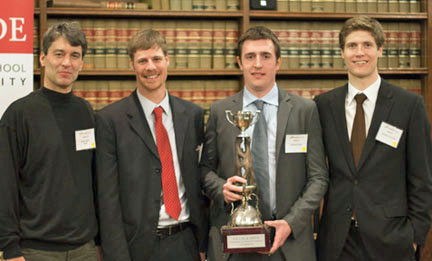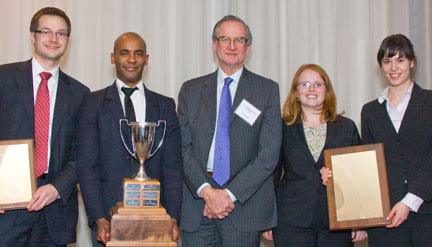The national and regional moot competitions across Canada have wrapped up, giving students a chance to relax their newly acquired reflex to practise speech gestures in front of reflective surfaces and understanding friends and family. While everyone is taking a well-deserved breather — or gearing up to make grand arm sweeps in front of an international crowd —
4Students has tallied up the results of the various competitions.
REGIONALS
SOPINKA CUP REGIONALS
Guy-Guérin Cup: A bilingual contest that deals mainly in crime-based problems that was hosted at the Montreal courthouse this year.
Overall winner: McGill University
Best Opening: Katrina Peddle (McGill University)
Best Closing: Anja Kortenaar (McGill University)
Arnup Cup: Formatted much in the same way as above, the Arnup Cup was hosted in Toronto at the Superior Court of Justice.
Overall Winner: Osgoode Hall Law School
Western/McIntyre Cup: The McIntyre Cup is for western Canadian schools in the Sopinka Cup and also deals with criminal cases. It was held at the University of Alberta Law Centre.
Overall Winner: University of Saskatchewan
McKelvey Cup: The eastern Canadian portion of the Sopinka Cup is the McKelvey, which took place at the University of Moncton.
Overall Winner: University of Moncton
British Columbia Law Schools Competitive Moot: Created to incite friendly competition between the University of Victoria and the University of British Columbia, this year’s moot was held at the Victoria Courthouse.
Overall Winner: University of Victoria
Davies Ward Phillips & Vineberg Corporate/Securities Law Moot: Eleven law schools flocked to Toronto to partake in this year’s corporate/securities moot, which focused on the issue of shareholder voting and proxy solicitation.
Overall Winner: Dalhousie University
2nd University of Toronto
3rd Osgoode Hall Law School
Top Oralist: Joe Ensom (University of Toronto)
2nd Nate Read-Ellis (University of Toronto) tied with Taylor Little (University of Alberta)
Top Factum: Dalhousie University
NATIONALS
Sopinka Cup: Sponsored by the American College of Trial of Lawyers and The Advocates’ Society, this national competition named after the late Supreme Court justice John Sopinka. This year’s criminal case dealt with an aggravated assault charge and was held at the Ottawa Court House.
1st University of Saskatchewan
2nd University of Windsor
3rd University of Ottawa?Best Opening: Ryan Truax (University of Windsor)
Best Closing: Andrea MacGillivray (Windsor)
Direct Examination: Andrea MacGillivray
Cross-Examination: Evan Thompson (University of Saskatchewan)
Overall Advocate: Evan Thompson
Fraser Milner Casgrain LLP Gale Cup Moot Competition: This year’s moot tackled the complex
R. v. Morelli case, which dealt with criminal possession of digital property. The issue was child pornography and teams had to present their views on the validity of a search warrant that was obtained on a problematic Information to Obtain a Search Warrant.
1st University of Toronto
2nd University of Montreal
3rd University of British Columbia
McLachlin Prize for best female mooter: Safia Lakhani (McGill University)
 Willms & Shier Environmental Law Moot
Willms & Shier Environmental Law Moot: A newcomer on the moot scene, Willms & Shier partnered up with Osgoode Hall Law School to create Canada’s first-ever national environmental competition. The case use for the debut was
Cousins v. McColl-Frontenac Inc., a dispute in which a property owner claimed that the major oil company damaged his property.
1st Queen’s University
2nd University of Toronto
3rd Dalhousie University
Barry Nelson Spiegel Best Appellant Factum Award: Joanna Kyriazis and Ryan Walker (University of Toronto)
D. Paul Emond Best Respondent’s Factum: Leslie Bateman and Brigid Wilkinson (Dalhousie University)
Distinguished Oralist Award: Julie Werneburg (University of Ottawa), Leslie Bateman (Dalhousie University), Sean Miller and Patrick Stratton (Queen’s University)
Concours Laskin Cup: Named after former chief justice Bora Laskin, this bilingual competition deals with administrative and constitutional law issues.
1st McGill University
2nd University of Toronto
3rd Osgoode Hall Law School
Harold G. Fox IP Moot: Only three years old, this national moot focuses on the complex issues of intellectual property. The 2011 case dealt with the common law tort of passing off, as well as a question of whether brand name chef knives were worthy of their design patents.
1st Osgoode Hall Law School
Gordon F. Henderson Award for Best Factum: University of Ottawa
Donald F. Sim Award for Best Oral Advocate: Kayla Kwinter (Queen’s University)
Dimock Stratton LLP Award for Best Mooter in a Non-graduating Year: Vanessa Park-Thompson (University of Toronto)
 The Wilson Moot
The Wilson Moot: Using constitutional-based problems, the moot was founded in 1992 and named after the late Supreme Court justice Bertha Wilson and is meant to better the justice system in favour of the many who are disempowered by the current legal system. This year’s case study revolved around the legal issues of women in minorities. Students used s. 1 of the Charter of Rights and Freedoms to challenge the Civil Marriage Act.
1st University of Toronto
2nd Osgoode Hall Law School
2011 White & Case Canadian Tournament: The White & Case is the Canadian nationals branch to the
Philip C. Jessup International Law Moot Court Competition, the world’s largest moot court competition. This year’s White & Case topic was an exciting debate over the legality of using unmanned drones and international anti-corruption laws. Winners earn the right to advance to the White & Case International Rounds, which will be held March 20 to 26 this year.
1st University of Ottawa
2nd University of Victoria
3rd McGill University
The Donald G.H. Bowman Tax Moot: This year was the inaugral Bowman moot to showcase Canada’s legal tax talent. It was hosted in Toronto by Fraser Milner Casgrain LLP.
1st: University of Windsor
Award for Best Factum, appellant: Kate Doyle and Jennifer Pocock from Osgoode Hall Law School
Award for Best Factum, respondent: Michael Alexis and Timothy Luk from University of British Columbia.
Award for Best Advocate: Lindsay Beelen from Osgoode.
Kawaskimhom Moot: The Kawaskimhom Moot is a national, non-competitive trial that is meant to provide law students with an opportunity to debate about aboriginal rights, and to add a cultural flare to legal education. This year, the moot attracted 14 schools from across the country, and 16 teams debated over a hypothetical inquiry into missing and murdered aboriginal women.

 Willms & Shier Environmental Law Moot: A newcomer on the moot scene, Willms & Shier partnered up with Osgoode Hall Law School to create Canada’s first-ever national environmental competition. The case use for the debut was Cousins v. McColl-Frontenac Inc., a dispute in which a property owner claimed that the major oil company damaged his property.
Willms & Shier Environmental Law Moot: A newcomer on the moot scene, Willms & Shier partnered up with Osgoode Hall Law School to create Canada’s first-ever national environmental competition. The case use for the debut was Cousins v. McColl-Frontenac Inc., a dispute in which a property owner claimed that the major oil company damaged his property. The Wilson Moot: Using constitutional-based problems, the moot was founded in 1992 and named after the late Supreme Court justice Bertha Wilson and is meant to better the justice system in favour of the many who are disempowered by the current legal system. This year’s case study revolved around the legal issues of women in minorities. Students used s. 1 of the Charter of Rights and Freedoms to challenge the Civil Marriage Act.
The Wilson Moot: Using constitutional-based problems, the moot was founded in 1992 and named after the late Supreme Court justice Bertha Wilson and is meant to better the justice system in favour of the many who are disempowered by the current legal system. This year’s case study revolved around the legal issues of women in minorities. Students used s. 1 of the Charter of Rights and Freedoms to challenge the Civil Marriage Act.